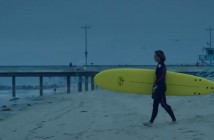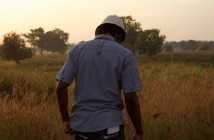The Great Alone (2015)
Cast: Dick Mackey, Lance Mackey
Director: Greg Kohs
Country: USA
Genre: Documentary | Adventure | Drama | Sport
Official Site: Here
Editor’s Note: The following review is part of our coverage of the 2015 Independent Film Festival Boston. For more information please visit iffboston.org or follow IFFBoston on Twitter.
The Iditarod is not only a challenging word to spell but a wholly incredible race. An over 1,000-mile long dog sled race across treacherous and freezing landscapes, where the racer has to rely only on himself, his dogs, and the kindness of strangers. While the clothing and equipment may improve, the value system and the beguiling simplicity of the race’s description remains constant. Lance Mackey, the subject of The Great Alone, is shown to be perhaps the complete embodiment of what the Iditarod stands for. Rough, old-fashioned, and devoted.
As fantastically as it captures the environment of Alaska, it just as skillfully observes the man, something that remains eminently impressive.
While the film mixes in plenty of historical perspective on the Iditarod, this will always be about Lance Mackey, and in all honesty, the guy is a kind of a mess. Were it not for dog sled racing, he would have no direction, wandering through the Alaskan tundra like some purposeless Caine. And thankfully, director Greg Kohs is not afraid to show that side. Lance is surprisingly honest as he recounts the trials and tribulations of his past and he has the maturity to not spend all of the time laying the blame at the feet of others. His struggles with authority, substance abuse, and just plain figuring out his place in the world do so much to humanize him. In Alaska, he may be the star of the Iditarod, but for the rest of us, he is just a long-haired Alaskan with dirty fingernails. The Great Alone recognizes the necessity of exploring this area.
 Unfortunately, in the film’s very proposed structure it seems doomed for failure. It is placed as a documentation of the most recent attempt by Mackey to conquer the Iditarod. Nevertheless, it becomes evident all too quickly that 2013 will not be Mackey’s year. Kohs at least has the foresight to recognize this early on and refocus the film. As he shades in the rest with footage from past attempts and an exploration of the man, the 2013 race sticks around as the skeleton that this is all built on. Slim and tiresome, this new footage is the least compelling and perhaps the most frustrating. Every time we return only to see Mackey falling further back it is a distraction from the connection that is being quietly forged. If it weren’t for Kohs’ devotion to the current incarnation, it could be lifted out entirely, and the film would likely be much better for it.
Unfortunately, in the film’s very proposed structure it seems doomed for failure. It is placed as a documentation of the most recent attempt by Mackey to conquer the Iditarod. Nevertheless, it becomes evident all too quickly that 2013 will not be Mackey’s year. Kohs at least has the foresight to recognize this early on and refocus the film. As he shades in the rest with footage from past attempts and an exploration of the man, the 2013 race sticks around as the skeleton that this is all built on. Slim and tiresome, this new footage is the least compelling and perhaps the most frustrating. Every time we return only to see Mackey falling further back it is a distraction from the connection that is being quietly forged. If it weren’t for Kohs’ devotion to the current incarnation, it could be lifted out entirely, and the film would likely be much better for it.
In stark contrast to the unkempt Mackey is the miraculous land surrounding him. The cinematography of The Great Alone is awe-inspiring. The Alaskan landscape is one of those few things that remain in American culture, outside of National Parks, as a complete encapsulation of the beauty and majesty of Mother Nature. The wide shots that rise over the mountains reduce Mackey to sheer nothingness. It is a continual reminder of just how vast the expanse of the Iditarod truly is, presenting not only the aesthetically grandiose but hinting at the possible terror lurking within. The wondrous cinematography isn’t limited to only these expansive shots that on their own could be mistaken as meticulous paintings, it also brings us closer to Mackey. The camera is devoted to its subject and captures even the smallest moments between Mackey and his dogs. There is a nearly romantic subtext that emerges wordlessly as Mackey rests with and cares for his team. As fantastically as it captures the environment of Alaska, it just as skillfully observes the man, something that remains eminently impressive.
It is this subtlety of camerawork and editing prowess that will likely go ignored, however it elevates the film past the trappings of just another historical sports documentary.
But this is what The Great Alone does so well, executing excellence without bombast. Much of the film is assembled of archival footage from years past. The editing is so seamless that it becomes difficult to notice just what was captured by Kohs’ team and that which was the product of Iditarod promotion. Kohs, his camera team, and his editors must have studied the footage meticulously and then done all that they could to be inspired by the methods. It never looks like the result of many disconnected people. The film is cohesive and complete, as if Kohs has been with Mackey for years, only now choosing to finally release his hard work. It is this subtlety of camerawork and editing prowess that will likely go ignored, however it elevates the film past the trappings of just another historical sports documentary.
As the film is endearing Mackey to the viewer and revealing the awesome wonder of the Alaskan terrain it also makes you excited about a race you only knew the name of. Director Greg Kohs boils these occasionally two week long races into captivating trials with a kineticism that is tensely palpable. While Mackey’s first win certainly remains his most emotionally rich, you crave for him to win again. You can’t wait to see him cross that finish line and overcome the boundaries, both natural and manmade that may stand in his way. A personal tale of athletic triumph, The Great Alone is able to blend so many complex elements into one energized shot to your heart. It’s about growing up. It’s about accomplishing your goals. It’s about family. It’s about love. The Great Alone is as dense as you allow it to be, it is simple yet complex. Rather than taxing its viewers to search for more, it presents everything so easily and elegantly, despite the inherent messiness of its subject.
The Great Alone is as dense as you allow it to be, it is simple yet complex. Rather than taxing its viewers to search for more, it presents everything so easily and elegantly, despite the inherent messiness of its subject.



